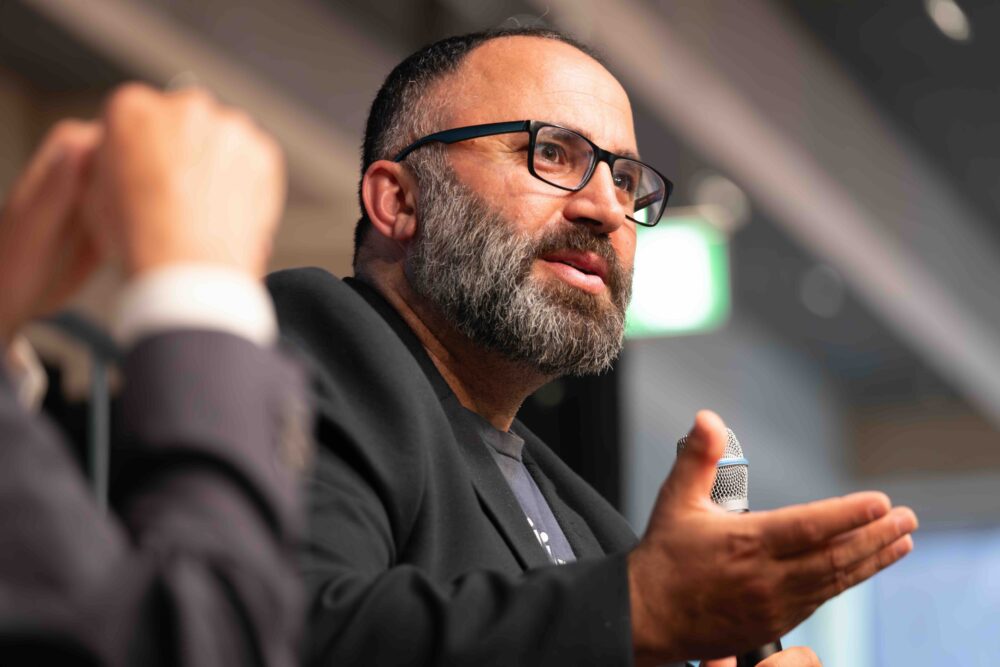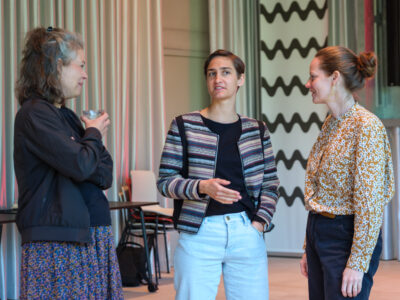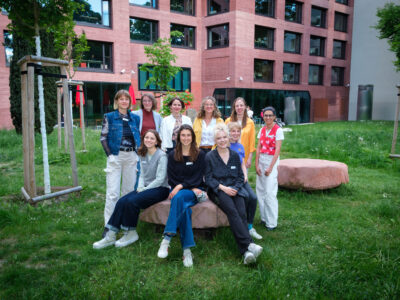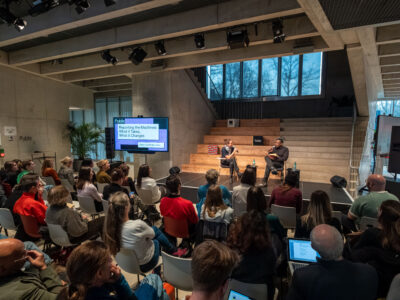“The solution must be in levelling up Palestinians”
Can the Middle East conflict really be resolved without violence? This was the topic of a stage discussion at Publix between Palestinian peace activist, Issa Amro, recipient of the Right Livelihood Award (“Alternative Nobel”), and Stephan Detjen, chief correspondent for Deutschlandradio.

Issa Amro has dedicated his life to non-violent resistance against the Israeli occupation of the West Bank in violation of international law. In 2024, he was awarded the ‘Alternative Nobel Prize’ by Right Livelihood. Among other things, he co-founded the Youth Against Settlements initiative and documents human rights violations in the Israeli-occupied part of Hebron. His persistent and consistently peaceful approach has been met with violence and reprisals by settlers, the Israeli military, and the Palestinian Authority. Since the latest Israeli military offensive in the West Bank, he has been subject to more intense pressure still. This interview is an abridged version of an in-depth stage discussion that took place at Publix on 19 June, carefully edited for better understanding. You can find the full video recording here.
Stephan Detjen: Issa, you just came from Hebron. I remember my trips there very well, it is a place of extremes, a mostly Arab population with a Jewish settlement in the heart of the city, in the historic centre, next to the mosque, which is a sacred place for Jews, as it is for Muslims and for Christians, the tombs of Abraham, of Isaac and Jacob. This city of 200,000 inhabitants has become emblematic for the situation in the Middle East. Some Israeli politicians see it as a model for the future of Palestine. They talk about the “Hebronization of Palestine”: what does that mean?
Issa Amro: Hebron is the microcosm of the Israeli occupation and apartheid. The settlements inside the city were founded in 1979. One year before I was born. As a child, I studied very hard and played football. That was my childhood. I didn't know anything about occupation, about any conflict. We didn't even feel the settlements in the beginning. But with time, they got more powerful.
Stephan Detjen: So you didn’t grow up in a politicized house?
Issa Amro: The majority of Palestinian families try to disconnect their children from political life, they want their children to invest in education, not to be in danger. Today I give lectures, I go to universities to speak about nonviolent resistance. The students come to me and say: “We like what you said. We want to join. Can you talk to my mother? Can you talk to my parents?" Being an activist in nonviolent resistance is illegal according to Israeli military law. So you will be an enemy of the system.
Stephan Detjen: What changed your way of thinking way back then?
Issa Amro: What shocked me was the Ebrahim Mosque Massacre (Cave of the Patriarchs massacre) in 1994. Baruch Goldstein broke into the mosque and killed 29 Palestinians. Hundreds were injured. I couldn’t go to school for three months, two of my school mates were killed. One of them had played football with me every morning. He was one year younger than me. I wondered: "Why? Why did they kill us?" I became too afraid to walk alone outside. My father made plans to leave the historic city where the settlers lived.
The Israeli Kahanists killed Palestinians in the Ebrahim Mosque, and then they killed Ytzak Rabin. The assassination of Rabin and the Ebrahim Mosque massacre were the two main obstacles for the peace process. And these came from the right wing. They came from today’s government in Israel. This government, Bezalel Smotrich, Itamar Ben-Gvir, Benjamin Netanyahu, they are the ones who destroyed the peace process and continue destroying it.
Stephan Detjen: Hebronization means a special way of dividing the city. Can you explain this a little further?
Issa Amro: They divided the city into Hebron 1 (H1) and Hebron 2 (H2). H1 is under Palestinian Authority control. H2 is without any real authority, but under Israeli military control. And with time, the Israeli government refused – it was Netanyahu – to give up land and give over authority. They started changing the names of our own streets from Palestinian Arabic to Israeli Hebrew names. And they divided the mosque.
But me, I continued my dream of becoming a professor in engineering. A normal human dream. I was doing well in university, in Palestine Polytechnic University, to achieve my goal. But the occupation didn't like that. And they closed my university for good. This is what made me an activist. I had kept away from politics. I had never participated in anything. And then I was punished for being a normal student in my university? That made me think, not to give up, but to fight. And what came first to me was the anti-apartheid movement in South Africa, the civil rights movement in the US, Gene Sharp, Mahatma Gandhi. And then I led the students protests to reopen the university. I graduated there as an engineer and as an activist.
Stephan Detjen: Let’s get back to Hebron as it is today. How do neighbours interact with each other?
Issa Amro: According to your religion, you walk on the main road or you walk on the side of the road. In Hebron, a Palestinian family lives next door with settlers that occupied the building. The Palestinian family is under Israeli military law, which means you are guilty until you are proven innocent. The settler family is under Israeli civilian law, which provides normal civil and political rights. So, when you have two sets of laws for different people in the same area, that is apartheid.
Stephan Detjen: What kind of violence did you personally experience there?
Issa Amro: I was attacked by settlers, attacked and beaten. Then I was arrested for being attacked. I know many, many Palestinians were arrested when they went to file complaints because we don't have legal support. We are under military law. We are guilty until proven innocent. Let's describe what happened: I sued the settler who broke my nose.
Stephan Detjen: You sued him in a civil court.
Issa Amro: … in the Israeli court. He was convicted, they sent him away from Hebron for one month. That was his penalty. If I had done it, if I was lucky and not killed, I’d end up in jail for five to seven years. Over the years, I was beaten up so many times, all over my body. None of these cases reached the courts. One time I was filming settler violence, and the settler attacked me, beat me up, damaged my camera. I escaped and sent the material to Israeli TV. The case went to court after four or five years. The prosecutor told the judge: "We made an agreement with the lawyer of this innocent settler to send him to the behaviour officer." I looked at the persecutor. I asked her "what's going on? I'm here. My camera was broken. I was beaten up. Who told you to make this deal?" This is the accountability we're talking about.
Usually I tell soldiers: "You are here to protect me." They tell me: "What protects you from us is your CCTV system and your fence." Everything I say, all my stories are documented. Otherwise, they’d say I'm manipulating the truth. Now I train young people to use the best nonviolent tool to react to settler violence and army aggression: document it with a video camera or smart phone.
Stephan Detjen: In your work and your talks, you use legal terms like “apartheid”, “war crimes” or “genocide”, so the question arises: what are the legal consequences? I think that's one of the reasons Germany tried to avoid these discussions for so long… why we said apartheid was something that happened in South Africa and that it has nothing to do with what's going on in Israel and Palestine. Genocide is something we did as Germans, it can't be repeated in history. But of course, the idea of these legal terms is that actions and crimes can be repeated.
Palestinians discuss these questions of violence and how to deal with them. As an advocate of nonviolence, what would you say to them?
Issa Amro: For me, nonviolent resistance is the best and only way to achieve our rights. I have been practicing it for 22 years. The “New York Times” described me as a Palestinian Gandhi without asking me. I don't want to be called Gandhi. Despite that, many people liked it.
But it's not only me. You know, the women in our society – as with German society – are the bosses at home. So, when we say “existence is resistance”, we're talking about the Palestinian women who make their husbands and their children stay in the targeted areas. The Palestinian families are staying in Area C, protecting the land, protecting the Palestinian identity of that area. So, nonviolence is Palestinian Society, Palestinian women, the children who fight to go to school in spite of the checkpoints, in spite of army aggression.
Stephan Detjen: Please, give us some examples of their resistance.
Issa Amro: In Hebron, some six-year-old students passed a checkpoint where a soldier harassed them and their teacher. Then settlers attacked them and attacked their teachers and their schools. Their insistence on reaching the school and studying is nonviolent resistance. 230 journalists have been killed in Gaza but journalism hasn’t ceased. They have a message. They have a passion. Many of the journalists on Palestinian land in the West Bank were arrested, detained, beaten, and targeted by settlers and soldiers. They still fight to tell the truth to the world. The engineers, the doctors, the lawyers, they all fight using nonviolent resistance.
Stephan Detjen: But there is violent resistance. Of course, there is another narrative, saying: we had the First Intifada and Israel signed the Oslo Accords. And then we had a Second Intifada, which was even more violent. Israel withdrew from Gaza under Ariel Sharon, and the situation got even more violent. So, a very violent answer is also inherent in Palestinian society, isn't it?
Issa Amro: According to Geneva Convention, Palestinians are allowed to use military resistance, but I choose a different approach, and not only me.
Stephan Detjen: There is an argument that under occupation, there is a legal right to resist, even violently. There are strict limitations whereby violence can only be exercised against occupation forces, against the military, while civilians have to be protected by all means.
Issa Amro: Yes. Before the First Intifada, we had civil disobedience in Beit Sahour, where Palestinians burned their Israeli occupation IDs in the streets, where they stopped buying Israeli products, and they bought their own cows – there is a great film about it on YouTube: The Wanted 18. That was nonviolent resistance. The first intifada: the majority of it was strikes, protests, rallies, civil society. Throwing stones toward military vehicles is not considered violence. Nonetheless, I don't do it, and I don't support it.
Stephan Detjen: It is violence, but it might be considered legitimate violence.I was in Israel during the second intifada. People wouldn't ride buses because they feared they could be blown up. Speaking about violence, of course, we also have to address October 7th. This was violence. Some said it was the Al-Aqsa flood. It was celebrated by many as an act of resistance, but it was brutal violence against civilians, against women, against children.
Issa Amro: For sure. I think all of us in this room disagree with any violence toward civilians. We disagree, and we don't justify it. All civilians should be protected.
Stephan Detjen: We’ve heard Israelis say “we have to use violence because the Palestinians…” and we know Palestinians who say “Look at what the Israelis do”. There must be another solution. How do Palestinians react to you suggesting: “don’t use violence”?
Issa Amro: First, I want to tell you that it's not two sides. It is occupation and the occupied people.
Stephan Detjen: Well, I mean, you have an occupier, and you have the occupied. It is two perspectives.
Issa Amro: Yes, but the victims should not be judged. We are oppressed and stateless. I live without basic human rights. And you are judging me about violence and nonviolence.
Stephan Detjen: I'm not judging. I'm asking.
Issa Amro: The whole point is the military system. Its purpose is to suppress Palestinians and make them not call for freedom. And if you want equal standards… did you question the US civil rights movement about the black people’s intention to become equal with the white supremacists? It's all about the systems. The main generator of violence is the occupation and the oppression. We cannot meet the victims and the oppressors with the same judgment. This is something very important.
How do I convince Palestinians to join my group?It’s not like I'm not trying to convince people who believe in violence to try nonviolence. Because the majority of Palestinians are nonviolent people. They are like the Germans. Human. See us as human beings and see us as a nation. You will understand that it's not about violence. The majority of Palestinians are pacifists.
Anti-Semitism is not part of our moral cause as Palestinians. This is one of the main reasons I use non-violent resistance, because it's a principle for me. We should all agree that human beings are more important than the systems. It's about human beings and a nation that deserves equality, justice and freedom, and a state of law. Do Palestinians have that? Do Palestinians have equal rights, the way that German people do? Do Palestinians feel safe? Do Palestinians have enough services? Do Palestinians have enough social life? Do Palestinians have the minimum dignity of any human being in the world? No. So it's not a conflict. It's not two sides. There is no justification to kill children, any children. There is no justification to kill civilians. And there is no justification for occupation. There is no justification that I live all my life under occupation.
Stephan Detjen: Let’s look at future perspectives. Do you see any solution to the conflict?
Issa Amro: My philosophy is that the gap and the imbalance between the Palestinians and the Israelis is too big to make peace. So, the solution must be in levelling up the Palestinians. For we Palestinians, the optimum solution is first to recognize us as human beings and as a nation, with a one-state solution or with a two-state solution. We want violence to be reduced to a minimum and the occupation to be ended as soon as possible. With the movement now in the world, especially in Europe and the UK, I see a good opportunity to end the occupation if we use it well.
Question from the audience: How can you use collaborations with artists, journalists and politicians for a concrete cause?
Issa Amro: If you are an artist, think about how to make the occupation expensive. If you are a journalist, you can make the occupation expensive by telling the truth as it is. If you are a lawyer, we need you. Think about creative, concrete ideas to level up Palestinian voices.
The city of Leipzig has a twinship with Herzlya, but they don't have one with any Palestinian city. Berlin has twinships with Israeli cities. Do they have one with any Palestinian city? No. So we want a partnership with a Palestinian city. This is leveling up Palestinians. Who works in education? Level up Palestinian education by student exchanges, by virtual exchange, by research, by joint master theses, joint articles, joint papers. At the moment, it's all about surveillance and artificial intelligence. That’s the interest of many researchers now. Hebron is the city of surveillance and artificial intelligence. We can study the ethics of artificial intelligence and surveillance by visiting Hebron and understand how the military is using it as a tool to force people from their homes. And you can use it to study it in your way. Palestinian education needs to be leveled up, Palestinian sports need to be leveled up, the Palestinian economy needs to be leveled up. We need a different public sphere in Palestine. That’s how we really create an infrastructure for Palestinians to be leveled up. Germany leveled up a lot of projects in Israel, so let's level up many projects in Palestine. And nobody will criticize you.
Photo credit: Paul Alexander Probst


